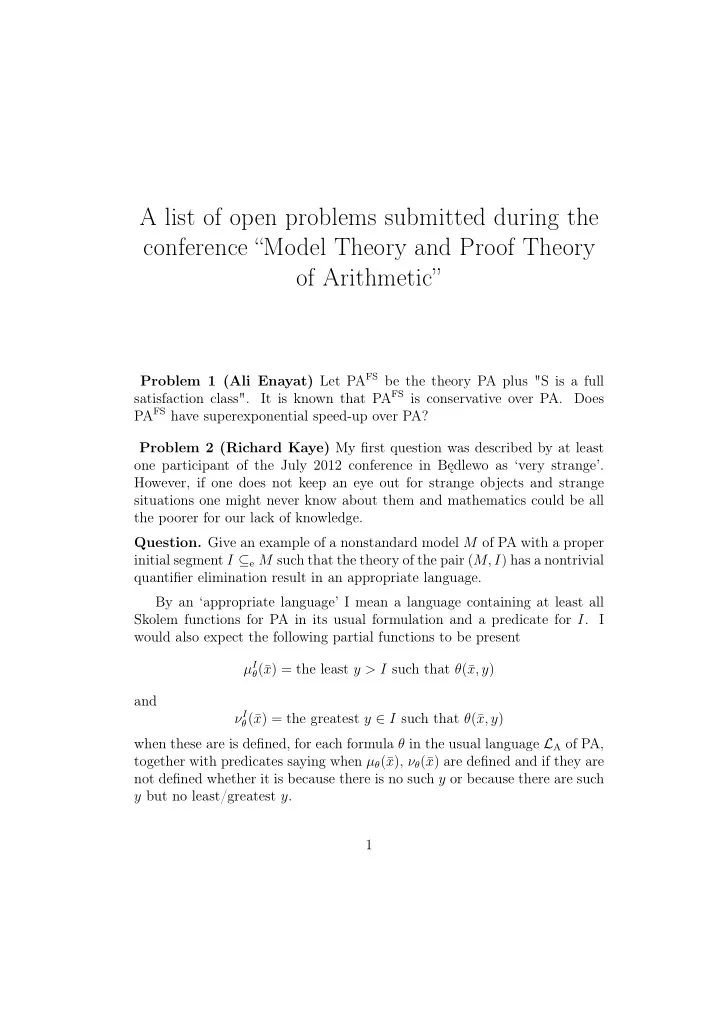

A list of open problems submitted during the conference “Model Theory and Proof Theory of Arithmetic” Problem 1 (Ali Enayat) Let PA FS be the theory PA plus "S is a full satisfaction class". It is known that PA FS is conservative over PA . Does PA FS have superexponential speed-up over PA ? Problem 2 (Richard Kaye) My first question was described by at least one participant of the July 2012 conference in Będlewo as ‘very strange’. However, if one does not keep an eye out for strange objects and strange situations one might never know about them and mathematics could be all the poorer for our lack of knowledge. Question. Give an example of a nonstandard model M of PA with a proper initial segment I ⊆ e M such that the theory of the pair ( M, I ) has a nontrivial quantifier elimination result in an appropriate language. By an ‘appropriate language’ I mean a language containing at least all Skolem functions for PA in its usual formulation and a predicate for I . I would also expect the following partial functions to be present µ I θ (¯ x ) = the least y > I such that θ (¯ x, y ) and ν I θ (¯ x ) = the greatest y ∈ I such that θ (¯ x, y ) when these are is defined, for each formula θ in the usual language L A of PA , together with predicates saying when µ θ (¯ x ) , ν θ (¯ x ) are defined and if they are not defined whether it is because there is no such y or because there are such y but no least/greatest y . 1
Of course a trivial QE result can be given by simply adding as predicates all definable objects in ( M, I ) . Less trivially, there are possible hierarchies of formulas over ( M, I ) and a theorem saying that there is no QE result of any particular complexity might yield powerful structural information on M or I —or there may be interesting examples. Problem 3 (Richard Kaye) If you prefer a less ‘crazy’ question, I would like to ressurect an old one. Question. Is there a complete theory T in a recursive first order language L which is not ℵ 0 -categorical such that all countable models of T are recursively saturated. This question goes back to the 1970s and is as far as I know still unsolved. One’s first reaction is there surely cannot be such a theory. That would be interesting. However models of Peano-with-top (PT) suggest at least a possiblity that goes the other way. A model of PT is like a model of I∆ 0 with a top element a and addition and multiplication treated as ternary relations rather than functions. All formulas can be thought of as ∆ 0 , bounded by the top element a . Thus there is a chance that there is a theory of PT with something rather like a truth predicate that is sufficient to ensure that all models are recursively saturated. (One would have to avoid difficulties with Tarski’s theorem on the undefinability of truth, of course. Perhaps the theory T would encode a suitable end-extension in which truth for the original model is defined.) Problem 4 (Roman Kossak) Let A be a first-order structure. A subset X of A is free if for all a, b ∈ X , if Th( A, a ) = Th( A, b ) , then Th( A, X, a ) = Th( A, X, b ) . Every countable recursively saturated model of PA has free elementary cuts. There are three known classes of such cuts: cuts deter- mined by coded increasing, or decreasing, ω -sequences of elements realizing an indiscernible type; infima of gaps realizing an indiscernible type; short elementary cuts whose last gap realizes an indiscernible type; and generic elementary cuts of Kaye and Tin Lok Wong. If I is one of those cuts, then ( M, I ) is not recursively saturated. The following problem seems curiously difficult. Let M be a countable, recursively saturated model of PA. Is there a free elementary cut I such that ( M, I ) is recursively saturated? Reference: Roman Kossak, Remarks on free sets. Bull. Polish Acad. Sci. Math. 34 (1986), no. 3-4, 117-122. 2
Problem 5 (Albert Visser) What are the provability logics of S 1 2 , T 1 2 and I∆ 0 + Ω 1 ? Problem 6 (Albert Visser) Consider a recursively enumerable sequential theory U . Is there a recursively enumerable extension W of PA − such that W is mutually interpretable with U ? (The answer is YES if we replace ‘mutually interpretable’ with ‘mutually locally interpretable’.) 3
Recommend
More recommend